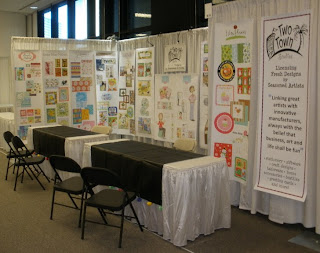 In art licensing, like any business, you will see people come and go both at the agencies and among those working on their own. Of course there are a host of reasons why this happens, often personal circumstances dictate the change, but over the years we’ve honed our opinion of what it takes to make an artist successful over the long term – attributes I like to call “The Second Set”.
In art licensing, like any business, you will see people come and go both at the agencies and among those working on their own. Of course there are a host of reasons why this happens, often personal circumstances dictate the change, but over the years we’ve honed our opinion of what it takes to make an artist successful over the long term – attributes I like to call “The Second Set”.
The “first set” would be what every agent can quickly evaluate – marketable style, good art skills, product understanding and maybe some experience. These are immediately evident as soon as we crack open a portfolio, and are essential to success in this business. The problem is that while all of those are necessary, they are certainly no guarantee that an artist will be able to compete in the marketplace.
" Licensing is about your clients and their products, not your art." -Jim Marcotte
The Second Set attributes are much harder to appraise – hence the difficulty many artists have locating an agent to sign them. Agents are generally cautious because a failed artist relationship, and we all have them, is not only very frustrating for everyone involved, but also expensive for the agency in terms of time, money and possibly even reputation.
 So what are we talking about here? What else could it take to make a career in the art licensing biz? Here are a few more important characteristics, in no particular order:
So what are we talking about here? What else could it take to make a career in the art licensing biz? Here are a few more important characteristics, in no particular order:
- Imagination. A continuous flow of new ideas, fresh concepts and new takes on old stand-bys. Successful licensed artists always seem to have many ideas going at once, and they are constantly starting, changing, discarding and evolving them.
- Curiosity. What is this market about? Why do some things sell and others don’t? What is that figurine made from? What companies produce big gift lines? And so on and so on – successful licensed artists are very engaged in their world.
- Competitive Spirit. There is stiff competition for every licensing dollar from many different directions. Successful artists really want that contract, are willing to do the work required to go after it, and if they don’t get it are asking why not, and what can I do to land the next one.
- Focus. You should treat this as your chosen career, not an opportunity to test the waters or dabble a bit in licensing. Get your priorities straight, because you will need to respond quickly and reliably to every request no matter how you feel about it. Licensing is about your clients and their products, not your art, and a thick skin is required.
- Patience. An artist needs to take the long view and plan to be in the business for years. Sustaining that effort is very difficult, particularly in the beginning, but absolutely necessary in art licensing. Almost every well known artist in this business has built their career over decades – one design and one contract at a time.
- Confidence. The ability to trust in your vision and go for it, and if it doesn’t work, to remain confident that your next idea will. Artist angst has killed many a promising career. Work at becoming really good at what you do, know that you are good at it and take your best shot every time.
Not only are these hard to evaluate before agreeing to begin a relationship, we cannot teach someone this - you can only teach yourself. An honest self-examination of your skills will go a long way toward understanding what you have to offer an agency – and ultimately will do wonders for your career.
 Jim Marcotte and his wife, artist and author Ronnie Walter, founded Two Town Studios in 2000. Two Town Studios is a successful art licensing and brand development agency representing 8 experienced artists.
Jim Marcotte and his wife, artist and author Ronnie Walter, founded Two Town Studios in 2000. Two Town Studios is a successful art licensing and brand development agency representing 8 experienced artists.We have over 300 active licensing agreements that generate millions of dollars in licensed product sales annually. Our designs have been licensed on giftware, all types of stationery, partyware, home and wall decor, garden product, fabric and woven goods, figurines, tabletop, cards and calendars, needlework, scrapbook products, packaging and more.
Our licensed product is sold at all levels of distribution - independent and boutique stores, mid-tier and mass such as Target, WalMart and Michael's, grocery, drug, catalog, internet and broadcast marketing.

6 comments:
Great post! Thanks Jim and Kate!
Great article. Thank you to Kate and Jim :)
Svetlana
Great article. Thanks!
Very interesting -- thanks for sharing!
Excellent article - Thank you Kate and Jim.
Thank you for this wonderful advice. Could you tell me if artists have to be able to digitally manipulate their own artwork?
Post a Comment